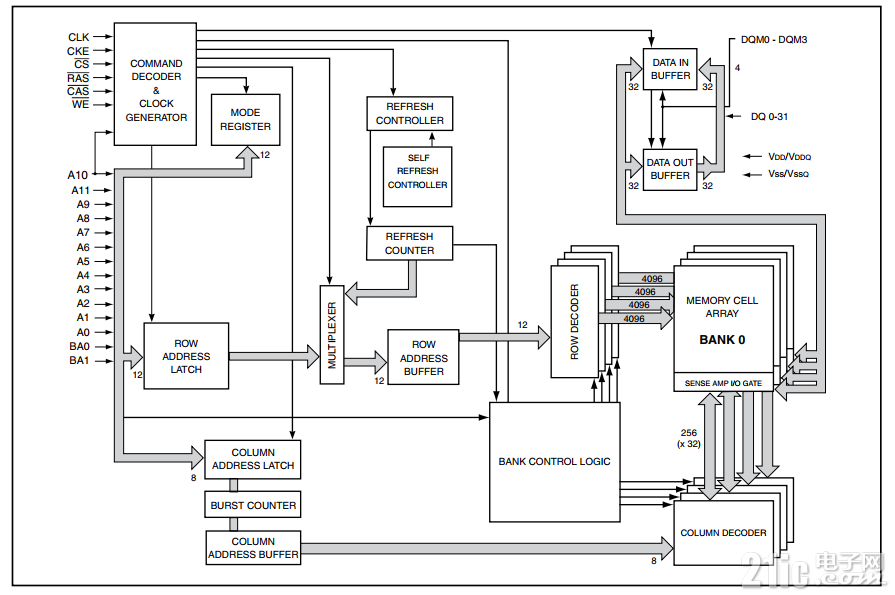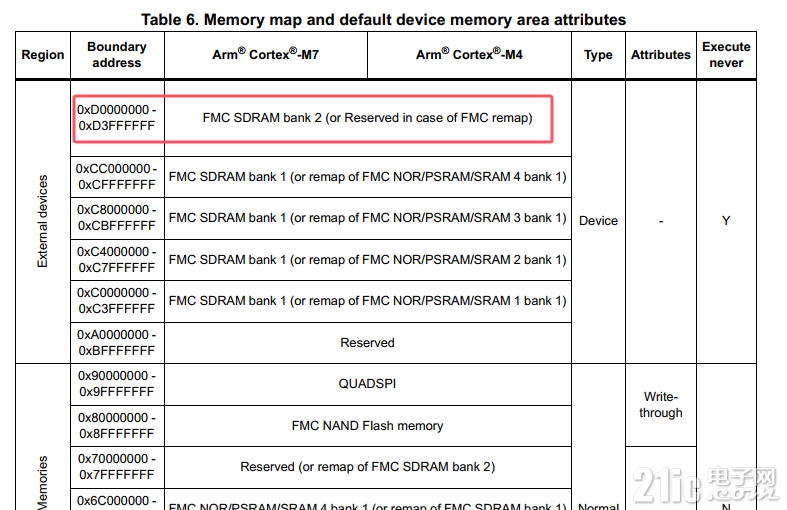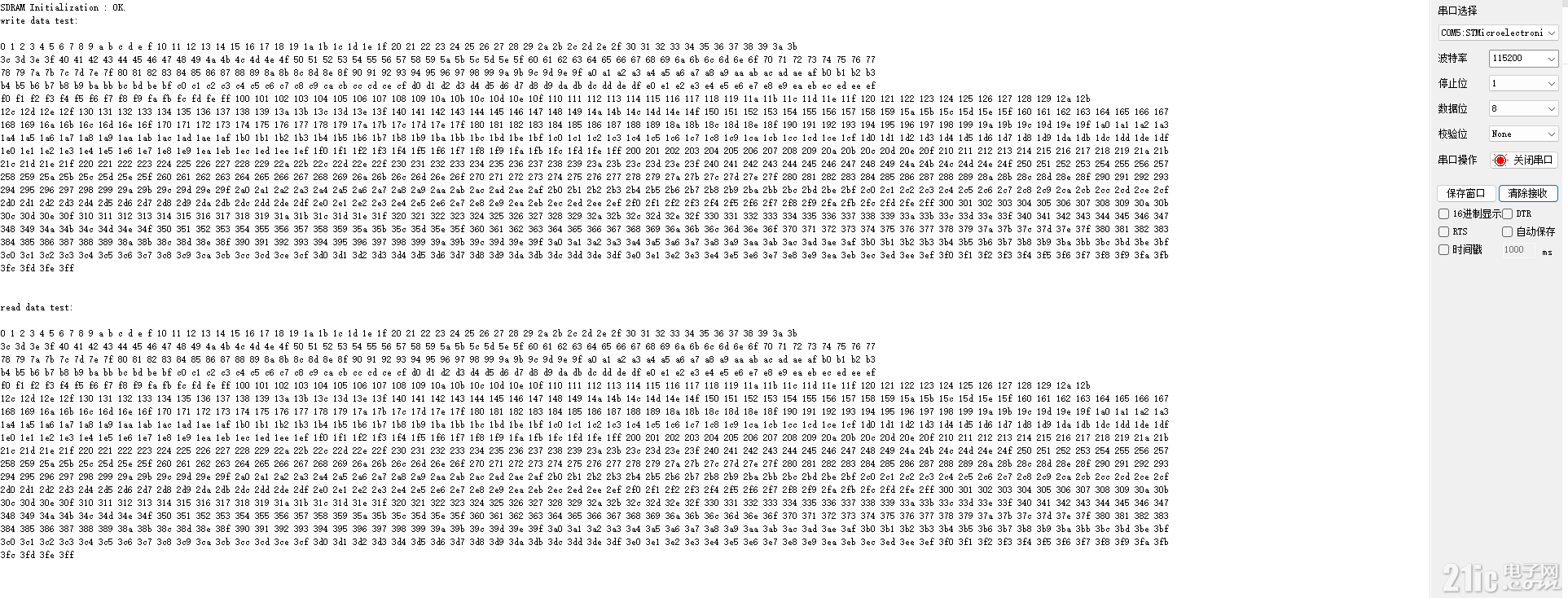这篇来学习测试下SDRAM存储器数据的读写。
一、硬件部分
1.1、SDRAM部分电路图

1.2、SDRAM芯片手册部分
开发板上焊接的芯片型号是IS42S32400,128Mb的SDRAM
芯片内部框图

1.3、芯片BANK
芯片支持两个BANK段

开发板的 SDRAM使用了BANK2存储开始地址0xD0000000

二、程序部分
测试使用官方BSP中的驱动程序
2.1、stm32h745i_discovery_sdram.c
- /**
- ******************************************************************************
- * [url=home.php?mod=space&uid=288409]@file[/url] stm32h745i_discovery_sdram.c
- * [url=home.php?mod=space&uid=187600]@author[/url] MCD Application Team
- * [url=home.php?mod=space&uid=247401]@brief[/url] This file includes the SDRAM driver for the MT48LC4M32B2B5-6A memory
- * device mounted on STM32H745I-DISCO boards.
- @verbatim
- How To use this driver:
- -----------------------
- - This driver is used to drive the MT48LC4M32B2B5-6A SDRAM external memory mounted
- on STM32H745I-DISCO board.
- - This driver does not need a specific component driver for the SDRAM device
- to be included with.
- Driver description:
- ------------------
- + Initialization steps:
- o Initialize the SDRAM external memory using the BSP_SDRAM_Init() function. This
- function includes the MSP layer hardware resources initialization and the
- FMC controller configuration to interface with the external SDRAM memory.
- o It contains the SDRAM initialization sequence to program the SDRAM external
- device using the function BSP_SDRAM_Initialization_sequence(). Note that this
- sequence is standard for all SDRAM devices, but can include some differences
- from a device to another. If it is the case, the right sequence should be
- implemented separately.
- + SDRAM read/write operations
- o SDRAM external memory can be accessed with read/write operations once it is
- initialized.
- Read/write operation can be performed with AHB access using the functions
- BSP_SDRAM_ReadData()/BSP_SDRAM_WriteData(), or by MDMA transfer using the functions
- BSP_SDRAM_ReadData_DMA()/BSP_SDRAM_WriteData_DMA().
- o The AHB access is performed with 32-bit width transaction, the MDMA transfer
- configuration is fixed at single (no burst) word transfer (see the
- SDRAM_MspInit() static function).
- o User can implement his own functions for read/write access with his desired
- configurations.
- o If interrupt mode is used for MDMA transfer, the function BSP_SDRAM_MDMA_IRQHandler()
- is called in IRQ handler file, to serve the generated interrupt once the MDMA
- transfer is complete.
- o You can send a command to the SDRAM device in runtime using the function
- BSP_SDRAM_Sendcmd(), and giving the desired command as parameter chosen between
- the predefined commands of the "FMC_SDRAM_CommandTypeDef" structure.
- @endverbatim
- ******************************************************************************
- * @attention
- *
- * Copyright (c) 2017 STMicroelectronics.
- * All rights reserved.
- *
- * This software is licensed under terms that can be found in the LICENSE file
- * in the root directory of this software component.
- * If no LICENSE file comes with this software, it is provided AS-IS.
- *
- ******************************************************************************
- */
- /* Includes ------------------------------------------------------------------*/
- #include "stm32h745i_discovery_sdram.h"
- /** @addtogroup BSP
- * @{
- */
- /** @addtogroup STM32H745I_DISCO
- * @{
- */
- /** @defgroup STM32H745I_DISCO_SDRAM SDRAM
- * @{
- */
- /** @defgroup STM32H745I_DISCO_SDRAM_Exported_Variables Exported Variables
- * @{
- */
- SDRAM_HandleTypeDef hsdram[SDRAM_INSTANCES_NBR];
- /**
- * @}
- */
- /** @defgroup STM32H745I_DISCO_SDRAM_Private_Variables Private Variables
- * @{
- */
- #if (USE_HAL_SDRAM_REGISTER_CALLBACKS == 1)
- static uint32_t IsMspCallbacksValid = 0;
- #endif
- /**
- * @}
- */
- /** @defgroup STM32H745I_DISCO_SDRAM_Private_Function_Prototypes Private Functions Prototypes
- * @{
- */
- static void SDRAM_MspInit(SDRAM_HandleTypeDef *hSdram);
- static void SDRAM_MspDeInit(SDRAM_HandleTypeDef *hSdram);
- /**
- * @}
- */
- /** @defgroup STM32H745I_DISCO_SDRAM_Exported_Functions Exported Functions
- * @{
- */
- /**
- * @brief Initializes the SDRAM device.
- * @param Instance SDRAM Instance
- * @retval BSP status
- */
- int32_t BSP_SDRAM_Init(uint32_t Instance)
- {
- int32_t ret = BSP_ERROR_NONE;
- static MT48LC4M32B2_Context_t pRegMode;
- if (Instance >= SDRAM_INSTANCES_NBR)
- {
- ret = BSP_ERROR_WRONG_PARAM;
- }
- else
- {
- #if (USE_HAL_SDRAM_REGISTER_CALLBACKS == 1)
- /* Register the SDRAM MSP Callbacks */
- if (IsMspCallbacksValid == 0)
- {
- if (BSP_SDRAM_RegisterDefaultMspCallbacks(Instance) != BSP_ERROR_NONE)
- {
- return BSP_ERROR_PERIPH_FAILURE;
- }
- }
- #else
- /* Msp SDRAM initialization */
- SDRAM_MspInit(&hsdram[Instance]);
- #endif /* USE_HAL_SDRAM_REGISTER_CALLBACKS */
- if (MX_SDRAM_BANK2_Init(&hsdram[Instance], FMC_SDRAM_ROW_BITS_NUM_12, FMC_SDRAM_MEM_BUS_WIDTH_16) != HAL_OK)
- {
- ret = BSP_ERROR_NO_INIT;
- }
- else
- {
- /* External memory mode register configuration */
- pRegMode.TargetBank = FMC_SDRAM_CMD_TARGET_BANK2;
- pRegMode.RefreshMode = MT48LC4M32B2_AUTOREFRESH_MODE_CMD;
- pRegMode.RefreshRate = REFRESH_COUNT;
- pRegMode.BurstLength = MT48LC4M32B2_BURST_LENGTH_1;
- pRegMode.BurstType = MT48LC4M32B2_BURST_TYPE_SEQUENTIAL;
- pRegMode.CASLatency = MT48LC4M32B2_CAS_LATENCY_3;
- pRegMode.OperationMode = MT48LC4M32B2_OPERATING_MODE_STANDARD;
- pRegMode.WriteBurstMode = MT48LC4M32B2_WRITEBURST_MODE_SINGLE;
- /* SDRAM initialization sequence */
- if (MT48LC4M32B2_Init(&hsdram[Instance], &pRegMode) != MT48LC4M32B2_OK)
- {
- ret = BSP_ERROR_COMPONENT_FAILURE;
- }
- }
- }
- return ret;
- }
- /**
- * @brief DeInitializes the SDRAM device.
- * @param Instance SDRAM Instance
- * @retval BSP status
- */
- int32_t BSP_SDRAM_DeInit(uint32_t Instance)
- {
- int32_t ret = BSP_ERROR_NONE;
- if (Instance >= SDRAM_INSTANCES_NBR)
- {
- ret = BSP_ERROR_WRONG_PARAM;
- }
- else
- {
- (void)HAL_SDRAM_DeInit(&hsdram[Instance]);
- #if (USE_HAL_SDRAM_REGISTER_CALLBACKS == 0)
- /* SDRAM controller de-initialization */
- SDRAM_MspDeInit(&hsdram[Instance]);
- #endif /* (USE_HAL_SDRAM_REGISTER_CALLBACKS == 0) */
- }
- return ret;
- }
- /**
- * @brief Initializes the SDRAM periperal.
- * @param hSdram SDRAM handle
- * @param RowBitsNumber Number of row to set
- * @param MemoryDataWidth The momory width 16 or 32bits
- * @retval HAL status
- */
- __weak HAL_StatusTypeDef MX_SDRAM_BANK2_Init(SDRAM_HandleTypeDef *hSdram, uint32_t RowBitsNumber,
- uint32_t MemoryDataWidth)
- {
- FMC_SDRAM_TimingTypeDef sdram_timing;
- /* SDRAM device configuration */
- hsdram->Instance = FMC_SDRAM_DEVICE;
- /* SDRAM handle configuration */
- hSdram->Init.SDBank = FMC_SDRAM_BANK2;
- hSdram->Init.ColumnBitsNumber = FMC_SDRAM_COLUMN_BITS_NUM_8;
- hSdram->Init.RowBitsNumber = RowBitsNumber;
- hSdram->Init.MemoryDataWidth = MemoryDataWidth;
- hsdram->Init.InternalBankNumber = FMC_SDRAM_INTERN_BANKS_NUM_4;
- hSdram->Init.CASLatency = FMC_SDRAM_CAS_LATENCY_3;
- hSdram->Init.WriteProtection = FMC_SDRAM_WRITE_PROTECTION_DISABLE;
- hSdram->Init.SDClockPeriod = FMC_SDRAM_CLOCK_PERIOD_2;
- hSdram->Init.ReadBurst = FMC_SDRAM_RBURST_ENABLE;
- hSdram->Init.ReadPipeDelay = FMC_SDRAM_RPIPE_DELAY_0;
- /* Timing configuration for as SDRAM */
- sdram_timing.LoadToActiveDelay = 2;
- sdram_timing.ExitSelfRefreshDelay = 7;
- sdram_timing.SelfRefreshTime = 4;
- sdram_timing.RowCycleDelay = 7;
- sdram_timing.WriteRecoveryTime = 2;
- sdram_timing.RPDelay = 2;
- sdram_timing.RCDDelay = 2;
- /* SDRAM controller initialization */
- if (HAL_SDRAM_Init(hSdram, &sdram_timing) != HAL_OK)
- {
- return HAL_ERROR;
- }
- return HAL_OK;
- }
- #if (USE_HAL_SDRAM_REGISTER_CALLBACKS == 1)
- /**
- * @brief Default BSP SDRAM Msp Callbacks
- * @param Instance SDRAM Instance
- * @retval BSP status
- */
- int32_t BSP_SDRAM_RegisterDefaultMspCallbacks(uint32_t Instance)
- {
- int32_t ret = BSP_ERROR_NONE;
- /* Check if the instance is supported */
- if (Instance >= SDRAM_INSTANCES_NBR)
- {
- ret = BSP_ERROR_WRONG_PARAM;
- }
- else
- {
- /* Register MspInit/MspDeInit Callbacks */
- if (HAL_SDRAM_RegisterCallback(&hsdram[Instance], HAL_SDRAM_MSP_INIT_CB_ID, SDRAM_MspInit) != HAL_OK)
- {
- ret = BSP_ERROR_PERIPH_FAILURE;
- }
- if (HAL_SDRAM_RegisterCallback(&hsdram[Instance], HAL_SDRAM_MSP_DEINIT_CB_ID, SDRAM_MspDeInit) != HAL_OK)
- {
- ret = BSP_ERROR_PERIPH_FAILURE;
- }
- else
- {
- IsMspCallbacksValid = 1;
- }
- }
- /* Return BSP status */
- return ret;
- }
- /**
- * @brief BSP SDRAM Msp Callback registering
- * @param Instance SDRAM Instance
- * @param CallBacks pointer to MspInit/MspDeInit callbacks functions
- * @retval BSP status
- */
- int32_t BSP_SDRAM_RegisterMspCallbacks(uint32_t Instance, BSP_SDRAM_Cb_t *CallBacks)
- {
- int32_t ret = BSP_ERROR_NONE;
- /* Check if the instance is supported */
- if (Instance >= SDRAM_INSTANCES_NBR)
- {
- ret = BSP_ERROR_WRONG_PARAM;
- }
- else
- {
- /* Register MspInit/MspDeInit Callbacks */
- if (HAL_SDRAM_RegisterCallback(&hsdram[Instance], HAL_SDRAM_MSP_INIT_CB_ID, CallBacks->pMspInitCb) != HAL_OK)
- {
- ret = BSP_ERROR_PERIPH_FAILURE;
- }
- if (HAL_SDRAM_RegisterCallback(&hsdram[Instance], HAL_SDRAM_MSP_DEINIT_CB_ID, CallBacks->pMspDeInitCb) != HAL_OK)
- {
- ret = BSP_ERROR_PERIPH_FAILURE;
- }
- else
- {
- IsMspCallbacksValid = 1;
- }
- }
- /* Return BSP status */
- return ret;
- }
- #endif /* (USE_HAL_SDRAM_REGISTER_CALLBACKS == 1) */
- /**
- * @brief Sends command to the SDRAM bank.
- * @param Instance SDRAM Instance
- * @param SdramCmd Pointer to SDRAM command structure
- * @retval BSP status
- */
- int32_t BSP_SDRAM_SendCmd(uint32_t Instance, FMC_SDRAM_CommandTypeDef *SdramCmd)
- {
- int32_t ret;
- if (Instance >= SDRAM_INSTANCES_NBR)
- {
- ret = BSP_ERROR_WRONG_PARAM;
- }
- else if (MT48LC4M32B2_Sendcmd(&hsdram[Instance], SdramCmd) != MT48LC4M32B2_OK)
- {
- ret = BSP_ERROR_PERIPH_FAILURE;
- }
- else
- {
- ret = BSP_ERROR_NONE;
- }
- return ret;
- }
- /**
- * @brief This function handles SDRAM MDMA interrupt request.
- * @param Instance SDRAM instance
- * @retval None
- */
- void BSP_SDRAM_IRQHandler(uint32_t Instance)
- {
- HAL_MDMA_IRQHandler(hsdram[Instance].hmdma);
- }
- /**
- * @}
- */
- /** @defgroup STM32H745I_DISCO_SDRAM_Private_Functions Private Functions
- * @{
- */
- /**
- * @brief Initializes SDRAM MSP.
- * @param hSdram SDRAM handle
- * @retval None
- */
- static void SDRAM_MspInit(SDRAM_HandleTypeDef *hSdram)
- {
- static MDMA_HandleTypeDef mdma_handle;
- GPIO_InitTypeDef gpio_init_structure;
- /* Enable FMC clock */
- __HAL_RCC_FMC_CLK_ENABLE();
- /* Enable chosen MDMAx clock */
- SDRAM_MDMAx_CLK_ENABLE();
- /* Enable GPIOs clock */
- __HAL_RCC_GPIOD_CLK_ENABLE();
- __HAL_RCC_GPIOE_CLK_ENABLE();
- __HAL_RCC_GPIOF_CLK_ENABLE();
- __HAL_RCC_GPIOG_CLK_ENABLE();
- __HAL_RCC_GPIOH_CLK_ENABLE();
- /* Common GPIO configuration */
- gpio_init_structure.Mode = GPIO_MODE_AF_PP;
- gpio_init_structure.Pull = GPIO_PULLUP;
- gpio_init_structure.Speed = GPIO_SPEED_FREQ_VERY_HIGH;
- gpio_init_structure.Alternate = GPIO_AF12_FMC;
- /* GPIOD configuration */
- gpio_init_structure.Pin = GPIO_PIN_0 | GPIO_PIN_1 | GPIO_PIN_8 | GPIO_PIN_9 | GPIO_PIN_10 | \
- GPIO_PIN_14 | GPIO_PIN_15;
- HAL_GPIO_Init(GPIOD, &gpio_init_structure);
- /* GPIOE configuration */
- gpio_init_structure.Pin = GPIO_PIN_0 | GPIO_PIN_1 | GPIO_PIN_7 | GPIO_PIN_8 | GPIO_PIN_9 | \
- GPIO_PIN_10 | GPIO_PIN_11 | GPIO_PIN_12 | GPIO_PIN_13 | GPIO_PIN_14 | \
- GPIO_PIN_15;
- HAL_GPIO_Init(GPIOE, &gpio_init_structure);
- /* GPIOF configuration */
- gpio_init_structure.Pin = GPIO_PIN_0 | GPIO_PIN_1 | GPIO_PIN_2 | GPIO_PIN_3 | GPIO_PIN_4 | \
- GPIO_PIN_5 | GPIO_PIN_11 | GPIO_PIN_12 | GPIO_PIN_13 | GPIO_PIN_14 | \
- GPIO_PIN_15;
- HAL_GPIO_Init(GPIOF, &gpio_init_structure);
- /* GPIOG configuration */
- gpio_init_structure.Pin = GPIO_PIN_0 | GPIO_PIN_1 | GPIO_PIN_4 | GPIO_PIN_5 | GPIO_PIN_8 | GPIO_PIN_15;
- HAL_GPIO_Init(GPIOG, &gpio_init_structure);
- /* GPIOH configuration */
- gpio_init_structure.Pin = GPIO_PIN_5 | GPIO_PIN_6 | GPIO_PIN_7 ;
- HAL_GPIO_Init(GPIOH, &gpio_init_structure);
- /* Configure common MDMA parameters */
- mdma_handle.Init.Request = MDMA_REQUEST_SW;
- mdma_handle.Init.TransferTriggerMode = MDMA_BLOCK_TRANSFER;
- mdma_handle.Init.Priority = MDMA_PRIORITY_HIGH;
- mdma_handle.Init.Endianness = MDMA_LITTLE_ENDIANNESS_PRESERVE;
- mdma_handle.Init.SourceInc = MDMA_SRC_INC_WORD;
- mdma_handle.Init.DestinationInc = MDMA_DEST_INC_WORD;
- mdma_handle.Init.SourceDataSize = MDMA_SRC_DATASIZE_WORD;
- mdma_handle.Init.DestDataSize = MDMA_DEST_DATASIZE_WORD;
- mdma_handle.Init.DataAlignment = MDMA_DATAALIGN_PACKENABLE;
- mdma_handle.Init.SourceBurst = MDMA_SOURCE_BURST_SINGLE;
- mdma_handle.Init.DestBurst = MDMA_DEST_BURST_SINGLE;
- mdma_handle.Init.BufferTransferLength = 128;
- mdma_handle.Init.SourceBlockAddressOffset = 0;
- mdma_handle.Init.DestBlockAddressOffset = 0;
- mdma_handle.Instance = SDRAM_MDMAx_CHANNEL;
- /* Associate the DMA handle */
- __HAL_LINKDMA(hsdram, hmdma, mdma_handle);
- /* Deinitialize the stream for new transfer */
- HAL_MDMA_DeInit(&mdma_handle);
- /* Configure the DMA stream */
- HAL_MDMA_Init(&mdma_handle);
- /* NVIC configuration for DMA transfer complete interrupt */
- HAL_NVIC_SetPriority(SDRAM_MDMAx_IRQn, 0x0F, 0);
- HAL_NVIC_EnableIRQ(SDRAM_MDMAx_IRQn);
- }
- /**
- * @brief DeInitializes SDRAM MSP.
- * @param hSdram SDRAM handle
- * @retval None
- */
- static void SDRAM_MspDeInit(SDRAM_HandleTypeDef *hSdram)
- {
- static MDMA_HandleTypeDef mdma_handle;
- /* Prevent unused argument(s) compilation warning */
- UNUSED(hSdram);
- /* Disable NVIC configuration for DMA interrupt */
- HAL_NVIC_DisableIRQ(SDRAM_MDMAx_IRQn);
- /* Deinitialize the stream for new transfer */
- mdma_handle.Instance = SDRAM_MDMAx_CHANNEL;
- (void)HAL_MDMA_DeInit(&mdma_handle);
- }
- /**
- * @}
- */
- /**
- * @}
- */
- /**
- * @}
- */
- /**
- * @}
- */
2.2、main.c
程序中定义0xD0070000地址开始的一段存储区域
- #include "main.h"
- uint16_t sdram[2000] __attribute__((at(0xD0070000)));
- static void MPU_Config(void);
- static void SystemClock_Config(void);
- static void CPU_CACHE_Enable(void);
- static void Error_Handler(void);
- void sdram_test(void)
- {
- uint32_t ts=0;
- printf("\r\nwrite data test:\r\n");
-
- for(ts=0;ts<1024;ts++)
- {
- sdram[ts]=ts;
- if(ts%60==0)
- {
- printf("\r\n");
- }
- printf("%x ",sdram[ts]);
- }
-
- printf("\r\n");
- printf("\r\n");
- printf("\r\nread data test:\r\n");
-
- for(ts=0;ts<1024;ts++)
- {
- sdram[ts]=ts;
- if(ts%60==0)
- {
- printf("\r\n");
- }
- printf("%x ",sdram[ts]);
- }
- }
- int main(void)
- {
- uint32_t i=0;
- MPU_Config();
- CPU_CACHE_Enable();
- HAL_Init();
- SystemClock_Config();
- init_delay(400);
- init_led();
- init_uart3(115200);
- if(BSP_SDRAM_Init(0) != BSP_ERROR_NONE)
- {
- printf("SDRAM Initialization : FAILED.\r\n");
- }
- else
- {
- printf("SDRAM Initialization : OK.");
- }
-
- sdram_test();
- while (1)
- {
- LED6_TOGGLE();
- HAL_Delay(100);
- }
- }
三、运行结果
下载程序后,串口输出写入和读出数据的内容

|